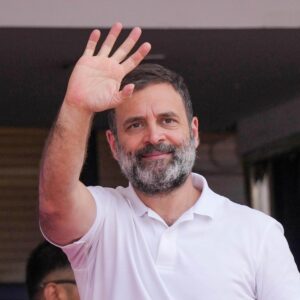The prospect of Rahul Gandhi emerging as a potent political force remains an open question. Will he shed the label of a ‘white elephant’ for India and make his mark as a dynamic leader? The historical ‘Gandhi privilege’ that granted political power to Indira Gandhi and Rajiv Gandhi seemed poised to extend to Rahul Gandhi. Yet, as Ramachandra Guha critically observed, Rahul Gandhi’s political acumen still appears in its infancy while stating “Rahul Gandhi remains a dilettante in politics”.
.
Dreams of Becoming India’s Prime Minister: A Distant Horizon?
A significant hurdle for Rahul Gandhi lies in his limited command over Hindi and his occasional choice of words. A recent instance where he misspoke ‘satya ke raaste pe chalo’ as ‘satta ke raaste pe chalo’ highlights his linguistic struggles. This contrasts starkly with Narendra Modi’s unwavering mastery over the language. Going head-to-head with an accomplished orator like PM Modi could prove to be an uphill battle.
Burden of History: Privilege, Burden, and Leadership
Born into the illustrious Gandhi family, Rahul Gandhi inherits a legacy intertwined with India’s emergency period and the 1962 India-Sino conflict. However, the silver spoon narrative becomes a liability in a nation that increasingly rejects entitlement based on lineage. In contrast, PM Modi’s rise from humble beginnings garners admiration, even from his critics
.
Rahul Gandhi’s deficiencies in administrative prowess, middling political acumen, and a charisma deficit are difficult to overlook. This is especially evident when juxtaposed with PM Modi’s resounding popularity among Indian voters. Rahul Gandhi’s instances of unparliamentary behavior not only tarnish his leadership persona but also erode his standing as a Member of Parliament.
Campaign Pitfalls and the Road Ahead
His ‘chowkidar chor hai‘ campaign, much like the opposition’s ‘Indira hatao, desh bachao’ slogan in 1977, suffered consequences of its own. History seems to echo, but the context has shifted. Meanwhile, the Indian National Congress finds itself devoid of public appeal due to its internal democratic deficit, dynastic tendencies, and a lack of coherent ideology. The party’s history of hasty coalitions and governance inefficiencies undermine its credibility as a dependable coalition partner.
Struggles with Grassroots Politics
Successful leaders understand the importance of grassroots politics and connecting with local communities. Rahul Gandhi’s engagement at the grassroots level has been limited and sporadic, raising questions about his understanding of ground realities and people’s concerns.
Rahul Gandhi represented the Amethi constituency in Uttar Pradesh for several terms. However, over the years, there were allegations that he didn’t pay adequate attention to the local issues and development needs of the constituency. This perceived disconnect was a factor in the 2019 general elections when he lost the seat to Smriti Irani, despite the Gandhi family’s historical association with Amethi .
In various state elections, especially in states with a strong regional focus, Rahul Gandhi’s ability to connect with local sentiments and issues has been questioned. For instance, in states like West Bengal and Tamil Nadu, his campaigns struggled to resonate with voters due to a perceived lack of understanding of regional dynamics
Inability to Rally Party Members
- Effective leaders inspire and rally their party members around a shared vision. Rahul Gandhi , previous president of indian national congress has faced challenges in uniting the various factions within the Congress party, leading to internal divisions that weaken the party’s overall strength. The G23, a group within the Indian National Congress, comprises a gathering of senior leaders who have expressed dissent and concerns about the party’s direction and internal functioning. Comprising prominent figures like Ghulam Nabi Azad, Anand Sharma, Shashi Tharoor, and Kapil Sibal .
A Call for Transformation
While ‘I-N-D-I-A’ can spark voter interest, translating that enthusiasm into electoral gains necessitates an overhaul of the overarching party structure. In the ever-shifting landscape of Indian politics, the Indian National Congress finds itself at a crossroads that transcends mere political challenges. Beneath the surface struggles lies an existential crisis that forces introspection. The party, once synonymous with India’s freedom struggle and governance, now grapples with relevance and identity. Its journey mirrors a nation’s evolution, but its course seems uncertain To recapture the glory it enjoyed in 1885, the party must untether itself from the Nehru-Gandhi legacy, embracing internal reforms to steer the winds of change.”
Reviving the Congress party’s fortunes requires a multi-faceted approach, marked by a blend of visionary leadership, responsive governance, and meaningful engagement. Rahul Gandhi, as a prominent leader, has the opportunity to spearhead this transformation by embracing adaptability, embracing innovation, and focusing on the welfare of the people he aspires to lead. The path to revitalization involves a series of deliberate steps aimed at not just winning elections, but also rebuilding the party’s credibility and relevance within the fabric of India’s democracy.
What a great research ! So informative , rare to find these types of instructive articles these days .
It’s refreshing to know that you appreciated the research and its informative content. Thank you !!